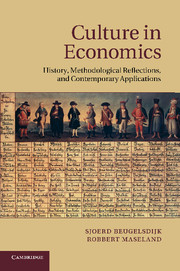Book contents
- Frontmatter
- Contents
- List of figures
- List of tables
- List of boxes
- Prologue
- Part I History and methodological reflections
- 1 Defining culture
- 2 How culture disappeared from economics
- 3 Explaining the rise of culture in modern economics
- 4 Culture in economics: contemporary theoretical perspectives
- 5 A methodological perspective on culture in economics
- Part II Contemporary applications
- Part III Evaluation
- References
- Index
5 - A methodological perspective on culture in economics
Published online by Cambridge University Press: 04 February 2011
- Frontmatter
- Contents
- List of figures
- List of tables
- List of boxes
- Prologue
- Part I History and methodological reflections
- 1 Defining culture
- 2 How culture disappeared from economics
- 3 Explaining the rise of culture in modern economics
- 4 Culture in economics: contemporary theoretical perspectives
- 5 A methodological perspective on culture in economics
- Part II Contemporary applications
- Part III Evaluation
- References
- Index
Summary
Introduction
In this chapter, we discuss the main methodological issues associated with research into culture in economics. In this discussion, we limit ourselves to those topics that are specific to research into culture in economics, or at least those that play a larger role in this particular field. As in any type of social scientific inquiry, we have to find answers to questions about ontology and epistemology. Also, we face issues such as internal and external validity, and we have to deal with decisions about what kind of data to use or how to analyze them. None of these issues, however, is specific to research into culture and economics. For students interested in the arguments for and against the various positions, we refer therefore to more appropriate volumes discussing methodology in general.
In addition to methodology, this chapter reviews the most common methods to study the impact of cultural differences on economic performance: values surveys and cross-cultural experiments. Again, this is not to say that by discussing only these we have covered the whole range of methods used in cultural economic research. A brief look shows numerous examples of case studies, discourse analysis, historical analysis and even casual observation in the literature (e.g. Morishima 1982; D'Iribarne 1989; Maseland 2006; Landes 1998; Fallows 1994; Etounga-Manguelle 2000). However, none of these methods is typical for the study of culture in economics, as they are widely used elsewhere. For this reason, we do not discuss them here.
- Type
- Chapter
- Information
- Culture in EconomicsHistory, Methodological Reflections and Contemporary Applications, pp. 119 - 150Publisher: Cambridge University PressPrint publication year: 2010



